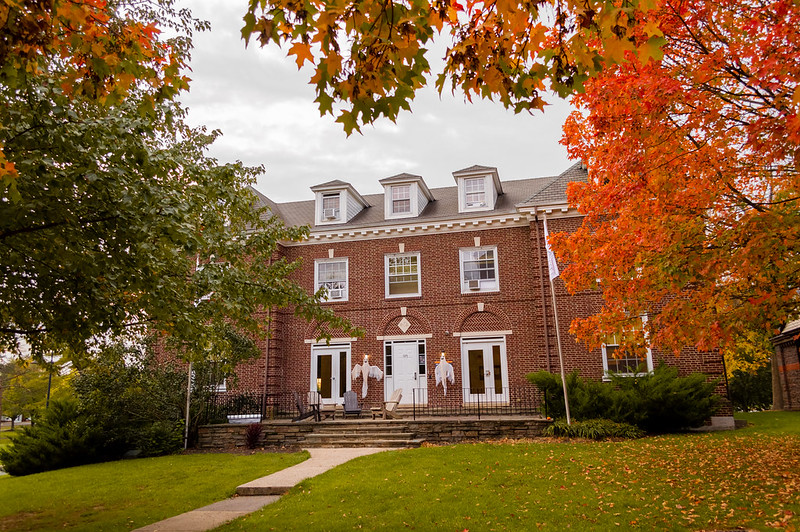Opinion: I Didn’t Want a Bid
By Grace Verbrugge ’22, Contributing Writer
We’ve all heard it before. Someone makes a valid critique of a Greek organization on campus, whether it is about heterosexism, classism, systemic violence, or general inaccessibility, and rather than being met with genuine concern for the root of the critique, a dismissive response is issued by swaths of members: “looks like someone didn’t get a bid.”
This type of response has, unfortunately, become the norm. I take great issue with such a statement for a multitude of reasons, and while many members of Greek Life would state that I am simply jealous, I am here to assure you that such an assumption could not be farther from the truth.
How immensely arrogant is it to believe that anyone criticizing an institution from outside of the said institution is only doing so because they want to be a part of it? I made the decision not to rush in the first place for a number of reasons. The financial toll, the deeply ingrained classism and elitist overtones, the pressure to drink, the pressure to conform, they’re just a few. All important, all valid.
However, the principal reason I chose not to rush is because of the rampant sexual violence within Greek Life. At the beginning of the school year, we had to do a Title IX education module in which one of the questions asked:
According to the module, which is not a group of students that is more likely to experience sexual assault?
– Students involved in Greek Life
– Sexual minorities
– Women and non-binary students
– Racial/ethnic minorities,
Unsurprisingly, the “correct” answer was students involved in Greek Life. I take issue with this because not only is it blatantly false, but it is being taught as the truth for the sake of advertising Greek Life as safer than it is. Women in sororities are 74% more likely to experience sexual assault than their non-affiliated counterparts (Fraternity Culture Linked To College Sexual Assault Problem, 2014), while men in fraternities are 3x more likely to commit sexual assault than those who are not in a fraternity (Opinion: “Rapebait” e-Mail Reveals Dark Side of Frat Culture | CNN, 2013). Not only are men in fraternities more likely to perpetrate sexual assault, but they are also more likely to be victimized. Greek organizations provide an insulated culture of protection, with many assaults being “handled internally” with some members pressuring survivors not to report so as not to stir the pot.
This is not to say that all fraternity brothers are rapists, and most assaults are committed by a small percentage of serial offenders, but the institutionalized structure of Greek organizations provides a shield from accountability that allows for these serial perpetrators to continue causing harm. While sorority women are often the victim of this violence, they are also capable of perpetrating it. I have several friends who have been assaulted by their own sorority sisters, and I know fraternity men who have been assaulted by them as well. Perhaps the strongest form of complicity however is the frequent dismissal, shaming, and silencing of survivors who try to speak out. I’ve worked with survivors in sororities on our campus who were assaulted at fraternities who have shared with me their stories of their chapter president telling them “not to overthink it” or their big saying “you’re probably just reading into it,” with one survivor confiding in me that when she told her social chair she had been assaulted by another fraternity’s social chair, she responded by saying “well we have a great mixer planned with them for next weekend so don’t say anything to mess it up.” For all the #girlbossing and girl power propaganda I see plastered all over Instagram, when it comes to choosing between their sister and a broken institution, I know far too many people who would pick the latter.
I’m a senior now, and in my time at Gettysburg, I’ve been assaulted 4 times. All but one of the perpetrators were in a fraternity, and that one was a fellow freshman. I don’t feel safe in most fraternity houses and despite being unaffiliated, I’m still somehow wrapped up in sorority drama I didn’t want any part in. I never rushed, yet Greek Life has undoubtedly impacted me in ways I didn’t imagine it would. The influence of Greek Life on our campus is immense, and if there is any hope for reforming such a twisted institution, members need to start listening to the critiques of their fellow Gettysburgians. These critiques do not come from a place of jealousy, but a place of concern and caring for our community. If you want people to stop thinking of Greek Life as elitist, discriminatory, and harmful, then stop reacting with defensive arrogance and listen to your community for opportunities to create positive change.


November 8, 2021
As a parent of a first year student at Gettysburg, I want to say how thoughtful and thought provoking I found this piece. Thank you to Ms Verbrugge for sharing her/their perspective and for reminding us of what the research says about Greek life on college campuses.